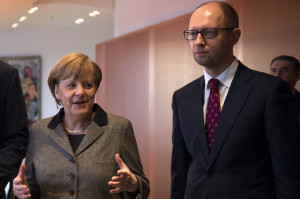
A spokesman for Chancellor Merkel’s cabinet responded to the controversial statement, saying that the German government does not want to comment on the Ukrainian Prime Minister’s statements, adding that the German government doesn’t question Germany’s responsibility for the death of Soviet citizens during WWII. The statement came in response to a query by the Russian Foreign Ministry about Berlin’s position on Yatsenyuk’s statement.
Context if everything
Yatsenyuk’s statement came as German, French and Russian diplomats as well as Ukrainian President Petro Poroshenko agreed to continue attempts to find a peaceful resolution to the civil war in Ukraine within the framework of the Normandy group, that is, without participation of the UK and the United States. It was within this setting that the Minsk agreement on September 5, 2015 was reached in the Belarus capital Minsk.
Yatsenyuk’s controversial statement came also as French President Francois Hollande explicitly stated that the regime of sanctions against Russia must stop, which Merkel had noted on several occasions before. Ironically, Hollande’s landmark statement was drowned out by the media spectacle that was created by the attack on the Charlie Hebdo magazine in Paris, within 48 hours after Hollande’s statement on France-Inter.
Ukraine’s Birth Pain – A geopolitical Buffer Zone between Germany and Russia
In his article entitled “Metaphysical Doubts Concerning the Existence of Modern Ukraine, a 1918 Creation of the German General Staff”, the American Historian Webster G. Tarpley describes the history of the region now designated as Ukraine from about 1200 until today. Tarpley concludes that the “founding father” of Ukraine as a nation, arguably, is the German General Staff in 1917 – 1918. That is, in particular, the German Field Marshal Paul von Hindenburg and the German General Erich Ludendorff.. The German General Staff recruited and trained some 10,000 prisoners of war from what was to become Ukraine, where after they were released and deployed to what was to become Ukraine, with the help of German military backup.
The German reasoning behind the support for the creation of a Ukrainian national identity and the German assistance to a small minority of Ukrainian nationalists was more than a tactical maneuver during the late stages of WWII which the German General Staff by then recognized as lost. It was a German attempt to create a quasi neutral zone between the USSR and Germany. One World War plus a Cold War later, during the early stages of the collapse of the USSR and during negotiations about the German reunification it was Russia who insisted on Ukrainian neutrality.
Both the last Head of State of the USSR, Michael Gorbachev as well as former French Foreign Minister Roland Dumas stressed that the precondition for Germany’s reunification was that NATO would not expand eastward. In 2014 the senior French Statesman reiterated that statement, noting that this understanding was the essence of peace.
Merkel’s Sound of Silence
While especially pro Atlantic Axis biased western media criticized German Chancellor Angela Merkel and her Cabinet for not commenting on Yatsenyuk’s statement, there are others who note that the wisest response to provocations is not to respond to them. It’s noteworthy that the audio of a leaked phone conversation between U.S. Assistant Secretary of State, Victoria Nuland and U.S. Ambassador to Ukraine Geoffry Pyatt revealed that the U.S. administration considered Yatsenyuk as “our man”. It’s noteworthy the British EU Foreign Affairs Chief Baroness Catherine Ashton also favored Yatz as “our man”. That fact can hardly have escaped Merkel, any other awake German politician or Hollande.
Germany is, slowly but surely building a German, French and continental European consensus against a US/UK dominated policy of tensions between Europe and Russia and with some success. The problem for any German government, regardless which party is at the helm, is that Germany still hasn’t regained its sovereignty, and that many of its foreign policy decisions still are being dictated by Washington and London. That is, some 70 years after the end of WWII. A statement like that of Yatsenyuk, seen from that perspective, is like a mosquito bite. It’s itching, but the more you start scratching it the worse it gets. The best and healthiest way to deal with it is to ignore it and slap the mosquito when it’s least expecting it.
Russia, France and Germany will continue working with Ukraine within the Normandy format. No Yatsenyuk will succeed at eliciting a statement from a senior German politician that could and would be used against the peace process by Germany’s 70-year-long liberator who refuses to leave and who has set its sights at grabbing more.
On Monday, January 12, 2015, German Foreign Minister Frank-Walter Steinmeier received his French, Ukrainian and Russian counterparts at the German Foreign Minister’s guest house, Villa Borsig. The quartet will be discussing how to break the stall-mate between the conflicting parties in Ukraine. It’s noteworthy that French President Francois Hollande, less than 48 hours before the Charlie Hebdo affair, assured that Russian President Vladimir Putin had assured him that Russia has no plans, whatsoever, to annex any part of Ukraine’s Donbass region, but that Russia does insist on having a sphere of interest in the predominantly Russian speaking region. Hollande also stressed that the regime of sanctions must end.
If to reply to Yatsenyuk’s apparent His-Story and other provocations, why not ask what Chinese philosophers asked themselves a few thousand years ago. Did you ever hear the sound of one clapping hand?
Dr. Christof Lehmann an independent political consultant on conflict and conflict resolution and the founder and editor in chief of nsnbc, exclusively for the online magazine “New Eastern Outlook”.
